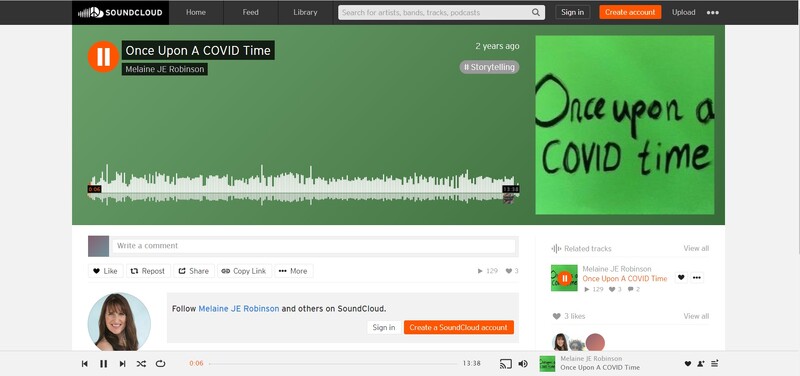Item
Melaine Robinson Oral History, 2020/11/01
Title (Dublin Core)
Melaine Robinson Oral History, 2020/11/01
Description (Dublin Core)
Hello,
My name is Melaine, I live in Hughesdale, Victoria, Australia and I would like to share this story of subtle community spirit that came through during the COVID-19 Pandemic of 2020.
I am also legally blind.
Thank you for your time.
Melaine
My name is Melaine, I live in Hughesdale, Victoria, Australia and I would like to share this story of subtle community spirit that came through during the COVID-19 Pandemic of 2020.
I am also legally blind.
Thank you for your time.
Melaine
Recording Date (Dublin Core)
Creator (Dublin Core)
Contributor (Dublin Core)
Type (Dublin Core)
Podcast
Link (Bibliographic Ontology)
Controlled Vocabulary (Dublin Core)
Curator's Tags (Omeka Classic)
Contributor's Tags (a true folksonomy) (Friend of a Friend)
Date Submitted (Dublin Core)
04/11/2021
Date Modified (Dublin Core)
06/07/2022
03/29/2023
Date Created (Dublin Core)
11/01/2020
Interviewer (Bibliographic Ontology)
Melanie Robinson
Interviewee (Bibliographic Ontology)
Melanie Robinson
Language (Dublin Core)
english
Duration (Omeka Classic)
00:13:38
Annotation (Omeka Classic)
00:00
Soft musical intro.
00:20
Melaine introduces the sounds of her daily walk and discovering something new. Describing the new additions to the neighborhood “spoonville”.
01:13
Different soft music as a transition.
01:48
Melaine introduces the idea of “spoonville” and the history of what “spoonvilles” are.
02:20
Melaine wants to hear from others in her community about the perceptions and ideas surrounding the popping up of the “spoonvilles”
02:50
First clip of a short interview from a community member, 25 year old, Zoe. Zoe states seeing it on social media and then in real life, calling it a sign of hope in a year of uncertainty.
03:40
Second short interview with another community member, Rosemary. Rosemary discovered the “spoonvilles” on daily walks, seeing new additions to the item all the time. Stating it would be a good thing for children, and that being a grownup herself, she still enjoyed them.
04:35
Third short interview is with a primary school student, 8 years old, and her mom. The student talks about how seeing the growing “spoonville” on her way to school makes her so happy. Her mom saw it before she realized it was a growing thing, and not just something that one family did.
05:50
Melaine describes how the SES [State Emergency Services] became involved in protecting the “spoonvilles”. Including spoon characters that were dressed as SES members, as well as their social media campaign.
07:10
Fourth interview with a SES member, Phil. Who responded to a ‘call’ for SES assistance in a “spoonville” that had been destroyed. It was repaired and put together again by SES team members and community members. This story was then picked up by national and local news. Phil states that he believed that the “spoonvilles” would have died out soon after loosening of restrictions due to COVID, but notices that it hasn’t still. Stating it creates a “lovely positive spirit”.
09:58
Spring sounds of a park and birds are present. Children are playing.
10:50
Melaine states it’s been more than 8 months since the first “spoonvilles” and they are becoming less prevalent as time passes.
11:35
Melaine believes that the “spoonvilles” were a tool that was important and should be remembered to create a positive feeling during a very uncertain time.
12:15
Melaine gives her goodbyes and acknowledges her community and editors.
Soft musical intro.
00:20
Melaine introduces the sounds of her daily walk and discovering something new. Describing the new additions to the neighborhood “spoonville”.
01:13
Different soft music as a transition.
01:48
Melaine introduces the idea of “spoonville” and the history of what “spoonvilles” are.
02:20
Melaine wants to hear from others in her community about the perceptions and ideas surrounding the popping up of the “spoonvilles”
02:50
First clip of a short interview from a community member, 25 year old, Zoe. Zoe states seeing it on social media and then in real life, calling it a sign of hope in a year of uncertainty.
03:40
Second short interview with another community member, Rosemary. Rosemary discovered the “spoonvilles” on daily walks, seeing new additions to the item all the time. Stating it would be a good thing for children, and that being a grownup herself, she still enjoyed them.
04:35
Third short interview is with a primary school student, 8 years old, and her mom. The student talks about how seeing the growing “spoonville” on her way to school makes her so happy. Her mom saw it before she realized it was a growing thing, and not just something that one family did.
05:50
Melaine describes how the SES [State Emergency Services] became involved in protecting the “spoonvilles”. Including spoon characters that were dressed as SES members, as well as their social media campaign.
07:10
Fourth interview with a SES member, Phil. Who responded to a ‘call’ for SES assistance in a “spoonville” that had been destroyed. It was repaired and put together again by SES team members and community members. This story was then picked up by national and local news. Phil states that he believed that the “spoonvilles” would have died out soon after loosening of restrictions due to COVID, but notices that it hasn’t still. Stating it creates a “lovely positive spirit”.
09:58
Spring sounds of a park and birds are present. Children are playing.
10:50
Melaine states it’s been more than 8 months since the first “spoonvilles” and they are becoming less prevalent as time passes.
11:35
Melaine believes that the “spoonvilles” were a tool that was important and should be remembered to create a positive feeling during a very uncertain time.
12:15
Melaine gives her goodbyes and acknowledges her community and editors.
Item sets
This item was submitted on April 11, 2021 by Melaine Robinson using the form “Share Your Story” on the site “A Journal of the Plague Year”: https://covid-19archive.org/s/archive
Click here to view the collected data.

